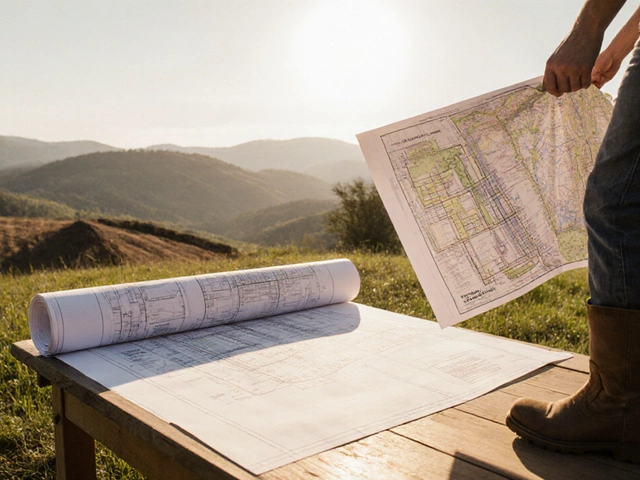If you’ve been dreaming about some space in the Mountain State, price is probably your first big question. So, how much does 1 acre of land actually go for in West Virginia right now? Depending on where you look, you’ll see numbers all over the place, but most listings today are sitting between $2,000 and $15,000 an acre. That’s a huge swing, but it all comes down to what you’re after and where you look.
Take rural counties like Pocahontas or Webster—here you might find an acre for about $2,500, especially if it’s off the beaten path and doesn’t have utilities. Head closer to Morgantown, or anywhere within easy reach of D.C., and you’re looking at $10,000 an acre or even more. The closer you get to towns, highways, or a river view, the steeper the price. But sometimes those bargains pop up just a mile from the pricier stuff, especially if you’re willing to do your own research instead of just looking at the first few listings on Zillow.
- Current Prices Per Acre in West Virginia
- What Impacts the Price of Land?
- Highs, Lows, and Regional Differences
- Tips for Buying Land in West Virginia
- What to Watch Out For – Hidden Costs and Pitfalls
Current Prices Per Acre in West Virginia
Prices for land in West Virginia can swing a lot, but here’s where numbers stand in mid-2025. If you’re hunting for raw, vacant land, you’ll find a pretty wide range based on location, what’s nearby, and whether there are utilities. As of June 2025, the state average price per acre is hovering around $6,100, but it’s honestly all over the map.
The rock-bottom deals—think basic forested lots with no road or water—are often stashed away in counties like Calhoun or Clay. There, you can score an acre for as little as $1,900. If you set your sights on more developed areas or land close to a college town like Morgantown, those numbers jump fast. In Monongalia County, 1 acre usually costs between $12,000 and $20,000, especially near main roads or if it has a view. Surprisingly, even some farm country in the Eastern Panhandle (like Jefferson County) fetches steep prices thanks to commuters from D.C.
Check out this basic snapshot of how 1 acre shapes up by county:
| County | Price Per Acre (2025 average) |
|---|---|
| Pocahontas | $2,400 |
| Clay | $2,100 |
| Raleigh | $5,200 |
| Berkeley | $10,000 |
| Monongalia | $14,000 |
| Jefferson | $15,500 |
The lowest prices usually come with a catch—remote spots and few amenities. Meanwhile, parcels around thriving hubs or with road access hike up fast. Keep in mind, the land prices West Virginia shows online are just a starting point. Final selling prices often dip a bit lower if you’re patient or good at negotiating with owners eager to sell.
What Impacts the Price of Land?
A bunch of real-world factors play into how much you'll pay for 1 acre in West Virginia. Some are obvious, while others sneak up on buyers who haven't looked beyond the listing price. If you're serious about snagging a great deal, keep your eye on these specifics.
- Location: Land close to towns like Morgantown, Charleston, or any spot with quick access to highways and shopping will almost always cost more. Rural plots with views or near state parks can be pricey too, but way-out land in the southern or central counties will be cheaper.
- Utilities and Access: If the land already has water, electric, or even high-speed internet available, expect extra costs per acre. Dirt-road access is normal in West Virginia, but paved-road frontage can bump the price up pretty fast.
- Zoning and Build Potential: Plots ready for a house or business bring higher prices. Undeveloped woodland is usually cheaper, but you might face serious costs later if you need to clear trees, perk (test) the soil for septic, or deal with flood zones.
- Topography: Not all land is buildable. Steep slopes, rocky ground, or flood plains drag the price down—unless there’s a hunting or recreation angle. Flatter, dry ground almost always attracts more buyers and bigger offers.
- Market Trends: Prices in West Virginia can shift quick, especially when out-of-staters start buying or when there’s talk of new development nearby. Check recent sales in the same county, not just asking prices, to get a sense of what people are really paying for land prices West Virginia.
It pays to walk the actual property before making an offer. A plot that looks good online might surprise you with a swamp, a neighbor’s junkpile, or no legal access road. Always double-check with the county planning office before getting excited about a cheap listing.

Highs, Lows, and Regional Differences
Scroll through land listings, and it hits you—land prices West Virginia style means wild differences from one county to the next. You might find a flat acre in McDowell County listed for under $1,500. Move east to Jefferson County, near the Maryland and Virginia borders, and the same acre could run you $20,000, even if it’s just raw woodland. Location really is everything here.
Southern counties like Logan, Mingo, and Wyoming usually offer the cheapest land. The jobs aren’t thick, and some areas are former coal towns, so sellers price land to move. Northern Panhandle counties—think Ohio and Brooke—are pricier thanks to Pittsburgh commuters. Morgantown, home to WVU, has steady demand, which keeps prices above state average.
The closer you get to city centers, public land, or big rivers, the faster prices climb. Want a view of the Potomac or easy access to the Cacapon Resort State Park? Expect to pay premium. Meanwhile, some land in out-of-the-way areas sits unsold for years, just waiting for the right buyer who doesn’t mind a winding gravel road or no cell service.
Price isn’t only about region. Usable land costs more than steep, rocky, or landlocked lots. Clear access roads, nearby utilities, and water on site will add a few thousand per acre, even in rural spots. Hunting parcels and places with timber value can fetch more too, especially near Route 33 or along the New River Gorge.
Best way to spot a deal? Watch for listings that have lingered online. Sellers might cut the price, especially late in the year when they’re tired of paying property taxes. Don’t be shy about making an offer below asking, especially in the cheaper counties. Sometimes the real value is just knowing where to look, and not being afraid to ask the locals.
Tips for Buying Land in West Virginia
Before you jump at the first "land for sale" sign, you’ll want to get your facts lined up. West Virginia’s market looks simple from the outside but there are quirks that catch newbies off guard.
First, always check land prices West Virginia with the county assessor or even recent sales on public records. Listing prices can be optimistic and sometimes lag behind what people are really paying. Some counties update their databases online, while others will just tell you over the phone.
Second, look at access. Not every acre comes with a legal road to it. If your land’s "landlocked," you’ll need to negotiate an easement, and some sellers leave out this detail. If there’s an old logging road or a farmer’s lane, get in writing that you can use it. Title companies can help you double-check access before buying.
Never assume utilities are nearby. Plenty of cheap parcels are cheap because you’ll have to pay thousands to get water, power, or internet onto the land. If it’s not on public sewer, know what it’ll cost to get a septic system approved—West Virginia’s Department of Health requires a percolation test for this, and rocky ground can shut down your plans fast.
Talk to the neighbors. Seriously. You’ll learn more from a 10-minute chat than you will from a dozen online listings. They’ll tell you about flooding, hunting rights, or tricky property boundaries. Country lines are famous for being just marked by a couple of old trees or a rusty fence. Always walk the boundaries with the owner if you can.
Lastly, don’t skip getting title insurance. The state’s mountain land passed through so many hands that property lines can get weird. Protect yourself in case someone’s great-granddad forgot to sign off in the 1960s.
- Review county tax maps online or through the courthouse.
- Check recent "sold" prices on West Virginia land in neighboring counties.
- Budget for surveys, perk tests, and hauling in utilities.
- If you’re hoping to build, talk to a local contractor before you buy—what looks flat on the map may be a nightmare to get a foundation on.
Smart buyers in West Virginia get local, get nosy, and always double-check what a listing promises. You’ll save cash and headaches down the road.

What to Watch Out For – Hidden Costs and Pitfalls
Buying land isn’t as simple as handing over the cash for 1 acre and calling it a day. The sticker price is just the start. One big trap a lot of buyers hit: hidden costs. If you want to know the real price when it comes to land prices West Virginia, you need to look a little deeper before sealing the deal.
First, check what comes with the land. Utilities—like water, sewer, and electric—aren’t always a given in rural West Virginia. Hooking up to county water can cost $1,000 or more if it’s available at all. Septic systems can run from $5,000 to $20,000, based on soil quality and county rules. If you pick a remote spot, you might end up shelling out more just to make it livable.
Another sneaky cost: property access. Does the lot touch a public road, or do you need to cross a neighbor’s land? If you’re stuck with an “easement” or “landlocked” property, you’ll need a legal right-of-way, which can turn into lawyer fees or, worse, a dealbreaker.
Here’s a quick breakdown of some typical extra costs buyers face in West Virginia:
| Cost Type | Typical Range | Notes |
|---|---|---|
| Survey | $500 - $2,000 | Depends on terrain and boundaries |
| Septic System | $5,000 - $20,000 | Required if no public sewer |
| Well Installation | $4,000 - $15,000 | Needed if no public water |
| Driveway Construction | $2,000 - $10,000 | Remote land = pricier driveway |
| Permit Fees | $250 - $3,000 | Building/zoning permits vary by county |
| Title Insurance & Closing Costs | $1,000 - $3,500 | Includes attorney fees and document filing |
The shape of the land is another thing people overlook. Flood zones or sloped lots can affect what you can build, and fixing those issues brings more costs. Speaking of rules—always double check for zoning restrictions or HOA fees. Some spots have super-tight county rules that can throw a wrench in your plans for cabins, tiny homes, or animals.
If you want to avoid stress, follow these quick tips:
- Never skip a survey—boundary disputes in WV can be messy and expensive.
- Ask about road access, especially for rural land.
- Dig into county rules: what you can do with the land, what’s allowed, and what’s off-limits.
- Don’t just trust online listings—call the county or talk to neighbors about the area and known headaches.
- Budget an extra 20-30% over the sale price to cover surprises.
Plenty of folks buy an acre thinking it’s a straightforward deal, then get blindsided by thousands in extra bills. Taking just a few extra steps can save you money—and a lot of hassle—down the road.





